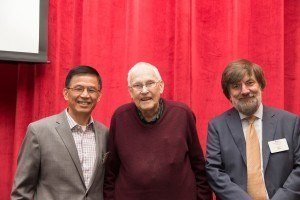The JBLC Center is named after John B. Little, MD, who was the James Stevens Simmons Professor of Radiobiology, Emeritus, in the Department of Molecular Metabolism at the Harvard T. H. Chan School of Public Health until his passing in 2020. Dr. Little’s pioneering studies were focused on the mutagenic and carcinogenic effects of ionizing radiation in cells directly targeted by radiation. Later, Dr. Little discovered what has become known as “non-targeted” biological effects of radiation including radiation-induced genomic instability, whereby genetic effects occur in the offspring of irradiated cells, and the “bystander” effect whereby genetic effects occur in un-irradiated cells in close proximity to irradiated ones. Today the bystander effect is a well-accepted phenomenon in radiation biology, but its biological implications – whether the effects are universally detrimental for us or possibly even beneficial under certain circumstances – remain hotly debated.
He was the founder of the Radiation Biology Program at HSPH and the visionary leader for the Radiation Biology Training Grant which began in 1975. He was the former Chair of the Department of Cancer Cell Biology, Director of the Kresge Center for Environmental Health and Chair of the Department of Physiology at the Harvard School of Public Health. A native of Boston, he received his BA in physics from Harvard University and an MD from Boston University, followed by an internship in medicine at the Johns Hopkins Hospital and a residency in radiology at the Massachusetts General Hospital. He joined the faculty of the Harvard School of Public Health in 1965, where he had been the Director of the Research and Training Program in Radiation Biology until his retirement. Dr. Little also served for 16 years as the Director of the Kresge Center for Environmental Health at Harvard (established in 1962).
Dr. Little was a Past President of the Radiation Research Society. He served on many advisory committees, councils, and editorial boards, and Chaired the Board of Radiation Effects Research of the National Research Council/National Academy of Sciences, the Science Council of the Radiation Effects Research Foundation in Hiroshima, and the Board of Scientific Councilors of the National Institute of Environmental Health Sciences. He was a consultant on Radiobiology to the Massachusetts General Hospital. Board Certified in Radiology, and a member of the American Physiological Society, the American Society for Photobiology, the American Association for Cancer Research, Dr. Little was also a past president of the Radiation Research Society. He served on the editorial board of many scientific journals and was the author or co-author of more than 525 scientific manuscripts.
Dr. Little’s research involved the study of the mechanisms involved in the response of mammalian cells to ionizing radiation, with particular reference to its carcinogenic and mutagenic effects. He was known for his earlier studies on the repair of potentially lethal damage in human normal and tumor cells, and for his characterization of the mechanisms for malignant transformation and the induction of mutations by radiation. Dr. Little was a recipient of the Failla Award of the Radiation Research Society, and the Henry S. Kaplan Distinguished Scientist Award from the International Association for Radiation Research. His alma mater, Boston University School of Medicine, acknowledged his contributions to the field with their Distinguished Alumnus Award in 1984.
An international figure in the field of radiobiology, Dr. Little was widely respected and cited for his intellectual accomplishments, mentoring skills, and collegial leadership.

